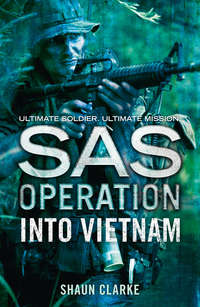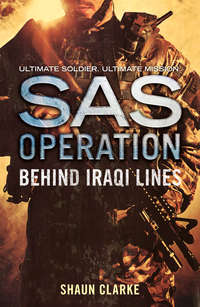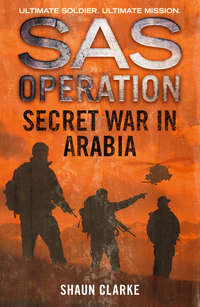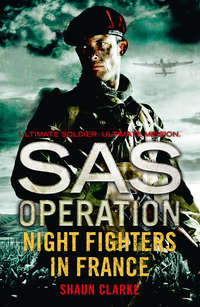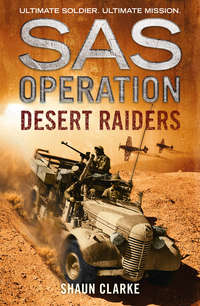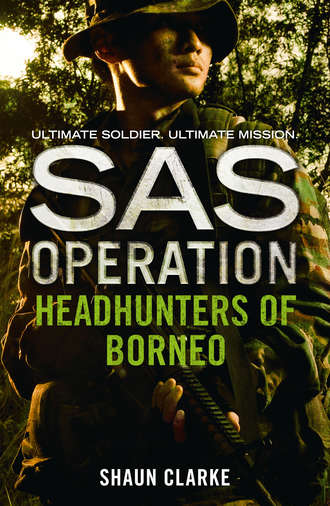
Полная версия
Headhunters of Borneo
The last comment was followed by a round of applause, handshaking, mutual backslapping and mutual congratulation. Callaghan let the hubbub die down before continuing: ‘The jungle war, or so-called “Confrontation”, between Britain and Indonesia is being fought on our part with a mixed force of Gurkhas, Australians and New Zealanders, totalling about 28,000 men. It’s being fought in an area as intractable as Vietnam or – for those old hands present – Malaya.’
‘If we did it in Malaya,’ Pete Welsh said, ‘we can do it here.’
‘Hear, hear!’ a few of the men chimed.
Callaghan grinned and nodded, acknowledging what they were saying, before adding a more cautious note. ‘Let’s hope so. However, please bear in mind that just as the CTs [communist terrorists] in Malaya were wizards in the jungle, so President Sukarno’s Indonesian troops are seasoned experts in this largely unexplored jungle region.’
‘Not as expert as us,’ Pete said stubbornly. ‘We can match anyone in the ulu.’
‘Right,’ Alf agreed.
Callaghan grinned, then continued: ‘The original purpose of Sukarno’s troops was to destabilize the fledgling Federation of Malaysia through clandestine guerrilla warfare and terrorism. However, when that failed, Sukarno’s generals turned to all-out invasion and blatant warfare, including air attacks on the Malay Peninsula and incursions along the border between Indonesian-held Kalimantan and Sarawak. Our job is to stop that.’
‘How?’ Sergeant Richard Parker asked in his chillingly quiet manner. Glancing down from the dais, Callaghan saw the grey eyes of Parker gazing up at him, unblinking and, to some, unnerving.
Parker was universally known as ‘Dead-eye Dick’ or simply ‘Dead-eye’ because of his exceptional marksmanship – displayed not only during his three years with the 2nd Battalion, Royal Regiment of Fusiliers, but also on the firing range of the SAS base at Merebrook Camp, Malvern, and then, most notably, during the Malayan Emergency of 1958. As Callaghan knew only too well, Dead-eye had gone into that campaign a rather quiet, serious young man who desperately wanted to be a good SAS trooper and had emerged, after some dreadful experiences in the Telok Anson swamp, an even quieter, emotionally withdrawn man but a superlative soldier.
Promoted to corporal as a reward for the bravery and skill he had displayed in Malaya, particularly in the swamp, Dead-eye had moved with the Regiment from Malvern to Hereford, where he acted as a somewhat restless member of the Directing Staff, clearly yearning for another war to fight. Bored with the peace-time fighting force, he had married a girl he met in Hereford, but separated from her three years later. By 1963, when he had been posted with the squadron to Borneo, the marriage was over.
Callaghan thought he knew why. For a long time after returning from Malaya, Dead-eye had been haunted by his appalling experiences in the Telok Anson swamp, in particular the death of the man he had most respected and tried to emulate, Sergeant Lorrimer, whose head had been guillotined by a female CT wielding a parang, a machete-like jungle knife. This gruesome scene had taken place right in front of Dead-eye.
Subsequently, back in Malvern, then in Hereford, Dead-eye had suffered repeated nightmares about the severed head of Lorrimer, whose eyes (so Dead-eye reported to the SAS psychiatrist) had kept moving frantically left and right in his head for some time after it had been severed. This bizarre phenomenon had been caused by a final, perfectly natural, nervous spasm of the muscles controlling the eyeballs, but to Dead-eye it had seemed that Lorrimer was still alive in some way and desperate to know what had happened to him – or, worse still, pleading for release from his nightmare.
More than anything else, it was the recollection of that severed head and its desperately swivelling eyes that had haunted Dead-eye for years afterwards and probably made him impossible to live with. It could not have helped the marriage; in fact, it had almost certainly ended it.
‘The main problem facing Major-General W. Walker, the British commander in Borneo,’ Callaghan replied, speaking directly to Dead-eye, ‘is that he has only five battalions to cover more than 1000 miles of jungle-covered border. Also, in addition to Sukarno’s Indonesian insurgents, he has to contend with an internal threat in the shape of the Clandestine Communist Organization, composed mainly of Chinese settlers from Sarawak. Initially, General Walker wanted us to act as a kind of mobile reserve, dropping onto the jungle canopy by parachute, as we did in Malaya, but this was deemed too dangerous and unlikely to produce worthwhile results. Instead, we’ll be operating in small patrols along the border, not engaging with the enemy unless absolutely necessary, but providing early warning of any Indonesian or CCO incursions.’
As most of the men hated R & I, as distinct from direct engagement, this announcement received the expected moans and groans, eventually silenced by a question from Pete Welsh.
‘We’ve virtually just arrived here,’ he said, ‘so know little about what’s going on. Who else is involved in this conflict? Sorry, boss, confrontation!’
Callaghan grinned at Pete’s mockery of the official term, then became serious again. ‘As Malaysia is a member of the South-East Asia Treaty Organization, the Aussie and Kiwi SAS have each sent us a squadron. The Kiwis, in particular – perhaps because of the large number of Maoris in their ranks – are the best jungle trackers we’ve got. I would ask you men of D Squadron – fresh as you are from training in West Germany and Norway and, in many cases, experienced as you are from your excellent work during the Emergency in Malaya – to be on your best behaviour with them.’
This was greeted with hoots of derisive laughter, which Callaghan deliberately ignored.
‘Also, having arrived here a few months before us, A Squadron has renewed old friendships with veterans of the Sarawak Rangers, Iban tribal trackers and headhunters brought to the Malay Peninsula in the 1950s as teachers and pupils of the SAS during the campaign.’
One of the new men, Private Terry Malkin, nervously put his hand up, cleared his throat and said, ‘’Scuse me, boss!’
‘Yes?’
‘What did you mean when you said that the natives were teachers and pupils?’
Malkin, only recently badged and still nervous with the old hands, was a Signaller. As he came from Northern Ireland, the other troopers often joked that he should be particularly good as a radio operator, blessed as he surely was with Celtic intuition and ‘second sight’. A lot of jokes bounced off Malkin’s hide on those spurious grounds.
‘We taught them about modern firearms and soldiering; they taught us about tracking in the jungle. Since coming here, A Squadron has been using them as a paramilitary force, the Sarawak Rangers, later known as the Border Scouts, but that’s being changed. From now on they’ll be used solely as trackers and support units to SAS-led Gurkha teams.’
‘Why?’ Dead-eye asked.
‘Last September our Scout post at Long Jawi, located near the border of Sarawak, was attacked and destroyed by over a hundred Indonesian soldiers who’d crossed the border from Kalimantan. Most of those men approached the post by boat, but according to the sole survivor of the attack, Corporal Ralph Sanderson, some of them emerged from the kampong itself, which they must have infiltrated days before.’
At the mention of Sanderson’s name, practically everyone in the room glanced automatically at the lean-faced soldier sitting in the back row, ignoring the flies and mosquitoes swarming around him. He was obviously used to them.
‘Though he came to Borneo with A Squadron,’ Callaghan explained, ‘Corporal Sanderson has been transferred to D Squadron to give us the benefit of his experience. If any of you men have any questions to put to him at any time over the next few months, don’t hesitate. For the moment, however, please limit yourselves to any questions you might have for me regarding the briefing so far.’
‘How did we react to the attack against Long Jawi?’ Dead-eye asked.
‘Swiftly and effectively,’ Callaghan replied without hesitation. ‘We flew Gurkhas to cut-off points on the Indonesians’ line of retreat, where most of the enemy were killed in ambushes. Nevertheless, the fact that the Dyaks had not mentioned their presence, and that the Border Scouts failed to lend adequate support to the few Gurkhas in the post, made it perfectly clear that we can’t depend on the former for anything other than tracking and intelligence gathering. Their training has therefore been taken over by the Gurkha Independent Parachute Company. Also, they no longer wear uniforms, which makes them less obviously members of the Security Forces. Naturally, we’ll still use them as porters or to fell trees to clear helicopter LZs, as they’re expert at both those tasks.’
‘What about us?’ Alf asked.
‘Since the Indonesian forces are making more frequent incursions into Sarawak and Sabah, we’ll be living almost entirely in the jungle, this time relying on our Border Scouts only for local information or when visiting a longhouse for a brief stay. Once we’ve settled in among the indigenous population, our function will be to patrol the areas where the Indonesians are most likely to cross the border. These include the comparatively flat plains along Sarawak’s western border; the valley tracks leading through Stass, about 30 miles from Kuching, the capital of Sarawak; the previously mentioned Long Jawi in the 3rd Division; the valleys south of Pensiamgan; and the waterways of eastern Sabah.’
Dead-eye turned his flat, grey gaze on Corporal Sanderson. ‘Speaking from experience, what’s your judgement on the Indo incursions?’
Sanderson smiled slightly, recognizing a kindred soul. ‘It’s my belief,’ he replied with confidence, ‘that small Indonesian patrols also infiltrate by other, less visible routes, particularly in the unexplored stretch of jungle known as “the Gap”, lying east of the Pensiamgan valleys of Sabah.’
‘Precisely,’ Callaghan interjected. ‘The Gap! Though largely unexplored territory, therefore particularly dangerous, that area will become your main battle zone.’
‘I thought we weren’t engaging the enemy,’ Alf said sarcastically.
‘You know what I mean, Trooper. If engagement is unavoidable, you engage; otherwise these are R & I patrols.’
‘How do we insert?’ Terry Malkin asked.
‘A good question from our most recently badged member!’ Callaghan responded, only half joking and going on to give a serious explanation. ‘We insert in small groups by chopper to an LZ within yomping distance of the respective target kampongs. From there we march the rest of the way. Once at their selected kampong, the individual small groups will ingratiate themselves slowly but surely, adopting a hearts-and-minds approach, as we did in Malaya. Finally, when the trust of the aboriginals has been gained, you will persuade them to let us bring more troops in by helicopter – the regular Army, Royal Marine Commandos and Gurkhas – to turn the kampongs into fortified camps. Once that’s done, we start sending SAS-led R & I patrols out into the surrounding jungle – either with or without the help of the natives.’
‘What are the hazards of this particular jungle?’ Terry asked, obviously taking this, his first campaign, very seriously.
Callaghan simply glanced at Sanderson, who said without a trace of irony: ‘Snakes, lizards, leeches, wild pigs, aggressive boar and primitive peoples: Land and Sea Dyaks, Muruts and Punans. Some of them are headhunters and don’t take too kindly to strangers.’
‘And we’re using them as trackers?’ the trooper asked doubtfully.
Sanderson grinned. ‘Only the ones we know and have personally trained. Others, when not actually headhunting, work for the Indos or CCO, so you have to be careful.’
‘When do we insert?’ Dead-eye asked.
‘The day after tomorrow,’ Major Callaghan replied. ‘Today you rest; tomorrow you prepare; the next day you leave. The flight is only twenty minutes. When you reach your LZ, an NCO from A Squadron will be there to take you in to the selected kampong and guide you through the hearts-and-minds requirements for this particular area. Any more questions?’
‘Yes,’ Pete Welsh said. ‘I’m told that the natives often offer their bare-breasted daughters as gifts. Are we allowed to accept?’
‘The elders are genuine when they offer,’ Sanderson replied from the last row, ‘but if you accept the offer, you’re liable to offend the young men of the kampong. The short answer, then, is a categorical no!’
A loud chorus of exaggerated groans filled the room, followed by Alf’s melodramatic: ‘War is hell!’
‘You should know,’ Callaghan responded. ‘That’s it. Class dismissed!’
The men gratefully pushed back their chairs and hurried out of the briefing room, determined to enjoy their last day of rest before the hard work began.
2
Selected as one team were Sergeant Parker, Corporals Welsh and Laughton, Private Malkin, all of D Squadron, and A Squadron’s Corporal Sanderson, who would be their general guide and adviser, both in the jungle and regarding their relationship with the Dyaks.
After their day of rest, which took the form of a lengthy booze-up in the NAAFI, they arose at first light to shower, shave, dress, have a hearty breakfast, then get kitted out with proper jungle wear. This included ‘olive-greens’; a soft, peaked hat with sweat-band and a yellow marker inside for identification; and rubber-and-canvas jungle boots with a metal plate inserted in the sole to prevent sharp objects, such as vicious punji stakes, going through the sole and into the foot. The kit consisted of ammunition pouches; two external water bottles; and the usual bergen rucksack including, in this instance, a useful bamboo carrier, two spare water bottles, a rolled-up sleeping bag, canvas sheeting and camouflaged hessian for setting up a temporary ‘basha’, and an escape belt holding high-calorie rations, hexamine fuel blocks, a fishing line and hooks, a small knife, waterproofed matches, a button-compass and a small-scale map.
Private Malkin was given a standard-issue Armalite M16 5.56mm assault rifle with 20-round box magazine, Corporal Sanderson opted for the generally less popular 7.62mm SLR, which he insisted he was used to, and the rest selected the 7.62mm Armalite assault rifle, which was light and compact, and therefore ideally suited to the jungle. Each man was also given a good supply of ‘36’ hand-grenades and ‘80’ white-phosphorus incendiary grenades, which were clipped to the webbed belts around their chests and waist. All of them were also given a standard-issue 9mm Browning High Power handgun with 13-round magazines and a Len Dixon holster. They were also given two knives, a Fairburn-Sykes commando knife and a parang.
‘Shit,’ Terry said, swinging the Malay jungle knife experimentally from left to right, ‘this thing looks pretty dangerous.’
‘We first had these in Malaya,’ Alf told him, ‘and a lot of us badly cut ourselves while learning to use them. It isn’t as easy as it looks, so handle that item with care, kid.’
‘Yes, boss.’ Terry clipped the sheathed parang to his belt, beside the commando knife. ‘I feel as heavy as an elephant with all this gear.’
‘You’ll soon get used to it, Trooper.’
Though every member of the four-man patrol had been trained in signals, demolition and medicine, and was presently undergoing training in the local language, each individual had to specialize in one of these skills. Trained to Regimental Signaller standard in Morse code and ciphers, the team’s specialist signaller was responsible for calling in aerial resup (resupply) missions, casualty evacuations and keeping contact with base. While all had been trained in demolition work, the team’s specialist in this field was responsible for either supervising, or carrying out, major sabotage operations. The job of the language specialist was to converse with the locals, to both gain their trust as part of the hearts-and-minds campaign and gather any information he could glean from them. Last but not least, the specialist in medicine would not only look after the other members of his patrol but also attempt to win the trust of the locals by treating them for any illnesses, real or imagined, that they might complain of.
As the team’s demolition expert, Pete Welsh was placed in charge of their single crate of mixed explosives, mostly of the plastic type such as RDX and PETN, along with both kinds of initiator: electrical and non-electrical, with the relevant firing caps and time fuses. As signaller, Terry was not asked to depend on his Celtic clairvoyance but instead was given an A41 British Army tactical radio set, which weighed 11lb excluding the battery and was carried in a backpack. Each of the men was supplied with a SARBE (surface-to-air rescue beacon) lightweight radio beacon to enable them to link up with CasEvac helicopters should the need arise.
Having been trained in first-aid and basic medicine, each man in the patrol was obliged to carry an individual medical pack that included codeine tablets and syrettes of morphine; mild and strong antiseptics (gentian violet and neomycin sulphate); chalk and opium for diarrhoea and other intestinal disorders; the antibiotic tetracycline; and an assortment of dressings and plasters. However, as the team’s medical specialist, more extensively trained with the US Army’s special forces at Fort Sam, Houston, Texas, and Fort Bragg, North Carolina, Alf was in charge of a comprehensive medical pack that included all the above items, but also a greater selection of drugs and dressings, as well as surgical equipment and a dental repair kit.
‘I wouldn’t let that butcher near my mouth,’ Pete said, ‘if my teeth were hanging out by the roots. I’d rather pull ’em myself.’
‘Any more sarcastic remarks,’ Alf retorted, ‘and I’ll practise my surgery on your balls instead of your teeth. I’m pretty good when it comes to the cut and thrust, so don’t cross me, mate.’
‘Another mad doctor,’ Pete replied. ‘We should call you Sukarno.’
As the team’s linguist, Dead-eye carried the lightest load. But once in the jungle, which was usually known by the native word ulu, he would compensate for this by being out front on ‘point’, as scout – the most dangerous and demanding job of them all.
Sanderson, as their guest, or rather guide, carried only his personal weapons and kit.
Kitted out just after breakfast, the men were then compelled to spend the rest of the long, hot morning on the firing range, testing the weapons and honing their skills. This was not as easy as it sounds, for the heat soon became suffocating, sweat ran constantly down their foreheads and into their eyes when they took aim, and they often choked on the dust kicked up by the backblast of the weapons. On top of all this, they were tormented by the usual swarms of flies and mosquitoes.
‘I give up,’ Alf said. ‘I can’t even see along the sights with these clouds of bloody insects everywhere. Let’s just call it a day.’
‘Get back on your belly on the ground,’ Dead-eye said. ‘And don’t get up till I say so.’
‘Yes, Sarge!’ Alf snapped.
They came off the firing range covered in a fine slime composed of their own sweat and the dust. After a refreshing shower, they washed the clothes they had used on the firing range, hung them up to drip dry in the still-rising heat, dressed in their spare set of olive-greens, then hurried to the mess for lunch. This was followed by an afternoon of lessons about the history, geography and culture of Borneo, with particular emphasis on the border between Sarawak and Kalimantan, where most of their operations would take place.
By the time the lessons had ended, in the late afternoon, the men’s clothes had dried and could be ironed (which they did themselves), then packed away in the bergens. When their packing was completed, they had dinner in the mess, followed by precisely one hour in the bar, which ensured that they could not drink too much.
Back in the spider, or sleeping quarters, each man had to take his place beside his bed, while Dead-eye inspected his kit and weapons, ensuring that no bergen was too heavy and that the weapons were immaculately clean and in perfect working order. Satisfied, he told them to be up and ready to leave by first light the following morning, then bid them goodnight and left the barracks.
When Dead-eye had gone Terry exhaled with an audible sigh. ‘Blimey!’ he almost gasped. ‘That Sergeant Parker scares the hell out of me. He’s so bloody expressionless.’
‘A born killer,’ Alf said gravely.
‘Heart of stone,’ Pete added.
‘He eats new boys like you for breakfast,’ Alf warned. ‘I’d be careful if I was you.’
‘Aw, come on, lads!’ Terry protested, not sure if they were serious or not. ‘I mean…’
‘Never look him directly in the eye,’ Pete said firmly.
‘Never speak to him unless spoken to,’ Alf chipped in.
‘If you see him take a deep breath,’ Pete continued, ‘hold onto your balls.’
‘He’ll bite them off otherwise,’ Alf said, ‘then spit them out in your face.’
‘Leave off, you two!’
‘It’s the truth,’ Pete said.
‘Cross our hearts,’ Alf added. ‘Old Parker, he’d cut your throat as soon as look at you, so it’s best to avoid him.’
‘How can I avoid him?’ Terry asked. ‘He’s our patrol leader, for God’s sake! I mean, he’s going to be there every minute, breathing right in my face.’
‘And he does so hate new troopers,’ Pete said. ‘You can take that as read.’
‘You poor bastard,’ Alf said.
Terry was starting to look seriously worried when Alf, able to control himself no longer, rolled over on his bed to smother his laughter in his pillow.
‘Night-night,’ Pete said chirpily, then he switched out the lights.
At dawn the next morning, after a hurried breakfast, they were driven in a Bedford RL 4×4 three-ton lorry to the airfield, where they transferred to a stripped-out Wessex Mark 1 helicopter piloted by Lieutenant Ralph Ellis of the Army Air Corps. Some of them knew Ellis from Malaya five years before, when he had flown them into the Telok Anson swamp in his Sikorsky S-55 Whirlwind.
‘You men haven’t aged a day,’ Ellis greeted them. ‘You always looked like a bunch of geriatrics.’
‘Listen who’s talking,’ Pete countered. ‘Nice little bald spot you’ve developed in five years. Soon you’ll be nothing but ears and head while we remain beautiful.’
‘The girls still love the pilots,’ Ellis replied. ‘They don’t view us as hooligans in uniform. They think we have class.’
‘And what’s this?’ Alf asked, poking Ellis in the stomach with his forefinger. ‘A nice bit of flab here.’
‘It’s the easy life the bastard lives,’ Pete informed his mate. ‘He’ll soon look like a cute little blancmange with a billiard ball on top.’
‘Very funny, I’m sure,’ Ellis replied. ‘Just get your fat arses in the chopper, thanks.’
‘Yes, mother!’ Alf and Pete replied as one, grinning wickedly as they clambered into the Wessex, followed by the others. Once inside, the men strapped themselves in, cramped together among the mass of equipment. The engines roared into life and the props started spinning. The helicopter shuddered as if about to fall apart, rose vertically until it was well above the treetops, then headed west, flying over a breathtaking panorama of densely forested hills and mountain peaks, winding rivers, waterfalls, swamps, aerial bridges and shadowy, winding paths through the ulu.
‘That jungle looks impenetrable from here,’ Terry observed, glancing down through the window in disbelief.
‘In many places it is,’ Alf replied, ‘but we’ll manage somehow.’
Twenty minutes later the Wessex landed in a jungle clearing and the men disembarked, to be greeted by another member of A Squadron, Sergeant Alan Hunt. Dropped on his own a week ago, he was living in the clearing, close to a stone-filled, gurgling river, his basha a poncho pegged diagonally from the lowest branch of a tree to the ground with his kit piled neatly up inside. Hunt was wearing jungle-green trousers and a loose shirt that seemed far too big for him. A Browning High Power handgun was holstered on his hip.


